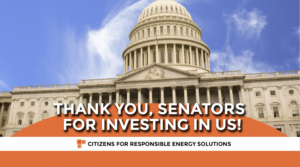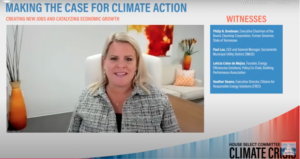2021 began in the spirit of bipartisanship. CRES Senior Advisor Kelly Ayotte joined CNN’s Van Jones to moderate a panel of lawmakers last week in a discussion aimed at identifying common sense clean energy solutions that address the triple crises of COVID-19, job loss, and climate change in the new Congress. Participants included Senator Chris Coons (D-DE) and Representatives John Curtis (R-UT), Darin LaHood (R-IL), and Donald McEachin (D-VA). The summit was part of the Atlantic Council Global Energy Forum, which has posted a full video recording.
Then, following the unexpected sub-freezing winter conditions in Texas that tragically crippled the state’s energy grid, CRES began its advocacy efforts for investing in infrastructure in February by launching the Let’s Invest in Us campaign. It focused on rebuilding American infrastructure, revitalizing manufacturing, and investing in our businesses and communities. The campaign slogan “Made in America” was more than just a slogan—it is a commitment to creating new jobs across the nation in our most critical infrastructure sectors, including clean energy.

People were demanding solutions that could develop clean energy and reduce emissions without sacrificing the economy or safe, reliable, affordable energy. CRES Forum Vice President of Policy and Advocacy Charles Hernick relayed these concerns when he testified before the U.S. House Transportation and Infrastructure Committee. During the hearing, “The Business Case for Climate Solutions,” he expressed that many companies, states, and municipalities have been hard at work for decades tackling climate challenges. He urged Congress not to “reinvent the wheel,” rather to build on existing best business practices for climate solutions and policies that support those initiatives.
“Congress should harness the power of free markets—by encouraging transparency and accountability— and empower companies to achieve their self-set goals, not pursue heavy-handed, top-down mandates that drive up costs or reduce options,” Hernick said. He added, the U.S. should “make strategic investments in R&D and infrastructure that serves an all-of-the-above approach including fuel efficiency, new clean fuels like hydrogen, and electrification—i.e., electric vehicles.”
During Earth Week in April, President Biden hosted a climate summit of world leaders where he pledged to reduce our country’s emissions by at least 50 percent by 2030, an arbitrary goal that CRES Forum analysis determined simply cannot be achieved without serious, significant costs to the U.S. economy.
Fortunately, Republicans hosted a parallel Earth Week event to unveil their “Energy Innovation Agenda,” consisting of nearly three dozen bills, including measures on resources ignored by Democrats, such as nuclear power, carbon capture, and our domestic supply of critical minerals.
To support the Energy Innovation Agenda and the Republican climate task force, CRES launched its own website outlining the legislation, RepublicanClimatePlan.com.
CRES Executive Director Heather Reams also testified before the U.S. House Select Committee on the Climate Crisis that week, reminding lawmakers that the U.S. has done a remarkable job of curbing its carbon emissions, while continuing to grow its economy. Yet, she warned that, “global emissions are increasing, as global energy demand is rising, primarily due to increased living standards in the develop world.”

“As a result,” she said, “U.S. climate and energy policy must foster innovations … that work for India as well as Indiana. Simply focusing on achieving net zero by 2050 here in the United States is unlikely to produce what it takes for poor countries to do the same.”
Next up in our 2021 Year in Review blog series – summer! Stay tuned!
